
News
Yes, growers can make their own biodiesel
The result of a recent joint venture between Bio-Len Reactors Inc. and Red Deer College is the first certified commercial portable biodiesel plant.
March 2, 2009 By Donna Fleury
The result of a recent joint venture between Bio-Len Reactors Inc. and Red Deer College is the first certified commercial portable biodiesel plant. “As a plumber, an antique tractor puller and inventor, I started making biodiesel in mason jars in my garage,” says Len Aucoin, of Bio-Len Reactors Inc. in Red Deer, Alberta. “It worked, so I moved to a bigger system and finally built my own crude biodiesel plant.” To test the product, Aucoin put 100 percent biodiesel into his new Diesel Cummins truck and after 40,000 km has not had any problems.
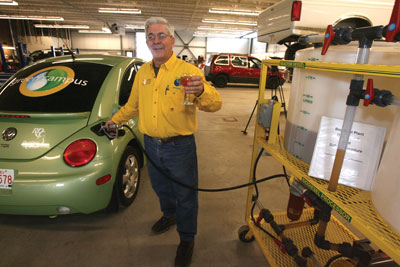 |
|
| Len Aucoin and the Bio-Len Reactor at Red Deer College.Photo courtesy of Red Deer Advocate. |
This fully certified, commercial, portable biodiesel plant is mobile on a 75 cm x 200 cm rack and weighs approximately 70 kg when empty. This plant will produce ASTM certified biodiesel and is built with top-of-the-line, explosion-proof components. Aucoin also used clear plastic PVC piping and plastic tanks rather than stainless steel to monitor the process. “The plant will produce 150 litres of biodiesel per batch, and requires 150 litres of waste restaurant cooking oil or cold pressed canola oil per batch,” explains Aucoin. “For farmers who have green seed and want to crush their own oil, a small crusher would cost about $8000. It takes about two days to make 150 litres, with less than three hours of hands-on time.”
Since the process requires methanol and other caustic reagents, safe handling and storage is important, as well as proper ventilation in the garage or wherever the plant is located.
The portable unit comes with an instruction manual, and one day of Aucoin’s time for proper setup. The cost is $9195 plus GST and delivery. To date 10 units have been sold to a range of clients from private individuals to colleges and hotels.
Aucoin believes farmers will find the unit useful, but depending on their fuel requirements they may want to use the biodiesel as a conditioner rather than to supply all their fuel needs. “Commercial fuel conditioners required for diesel are fairly expensive, so instead you could use four litres of biodiesel for 1000 litres of fuel.” The biodiesel costs about 21cents per litre to produce. The estimated payback based on two batches per week from canola oil is less than one year.
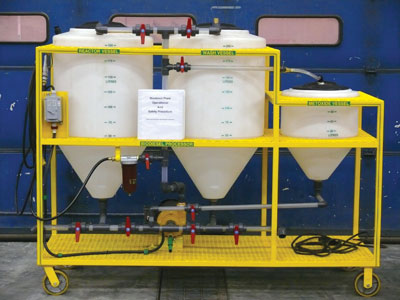 |
|
| Small Scale Portable Bio-Diesel Reactor System manufactured by Bio-Len Reactors of Red Deer, Alberta. Photo courtesy of Red Deer College.
|
|
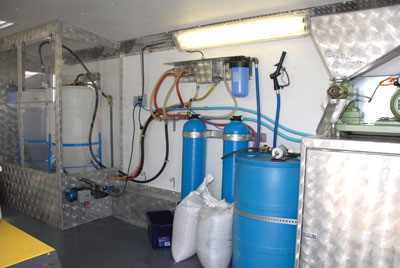 |
|
| Inside CIGI portable biodiesel pilot plant. Photo courtesy of the Canadian International Grains Institute.
|
|
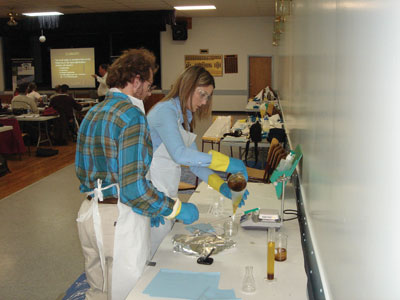 |
|
| Setting up the CIGI biodiesel lab for hands-on sessions. Photo courtesy of the Canadian International Grains Institute.
|
|
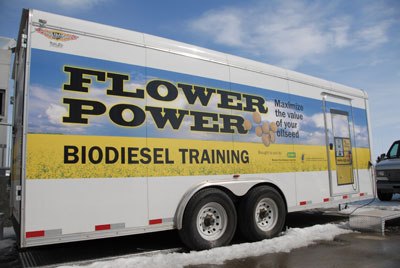 |
|
| CIGI portable biodiesel pilot plant. Photo courtesy of the Canadian International Grains Institute. |
Cutting through the hype
With all of the hype and information surrounding biodiesel, it is important to have the right information before getting involved. The Canadian International Grains Institute (CIGI) decided to help farmers and industry find the right information. “Our main objective is to get accurate, unbiased information about biodiesel out into Canada and abroad,” explains Dr. Rex Newkirk, CIGI Director of Biofuels and Feed. “We want to help farmers and industry understand what biodiesel is, how it is made and used, and help identify some of the opportunities.”
To accomplish their objectives, CIGI built a portable biodiesel pilot plant to demonstrate how biodiesel can be produced using various types of products. “We used the portable unit, which was sponsored by the Manitoba Rural Adaptation Council, in conjunction with training courses, ranging from one to three intensive day sessions,” explains Newkirk. “The one day course was quite popular, and allowed participants the opportunity to make their own small batches of biodiesel at lab stations and then compare it to the product made in the pilot plant.”
Two important aspects stressed in the workshop are safety and quality. “The product itself is safe, but some dangerous chemicals are used during production such as methanol, which is flammable and toxic,” says Newkirk. “We also want to make sure people understand quality issues and how to manage them. Biodiesel made for resale must meet ASTM standards.” As of August 31, 2008, 1637 people participated in sessions held in 54 communities in British Columbia, Alberta, Saskatchewan, Manitoba and Ontario, plus, several thousand people visited the trailer at major agricultural shows, exhibitions and rural fairs.
“We also wanted to encourage participants to look at biodiesel from a whole business perspective and to carefully assess the opportunities that may be unique to their area,” explains Newkirk. For example, some areas may have enough local restaurants and hotels to provide a source of free or relatively inexpensive restaurant grease. Other areas may have a higher amount of off-grade oilseeds available in some years, or areas of marginal lands not useful for food crops, but suitable for new crops such as camelina. “It’s important to understand that biodiesel can be produced from many products, none of which are destined for the food market,” adds Newkirk. “We also want to make sure people understand that biodiesel and ethanol are not the same, they are very different businesses and business models.”
Clearing any confusion
CIGI also wanted to dispel the misconceptions surrounding biodiesel. “Biodiesel is a good product and can be used safely in vehicles and machinery,” says Newkirk. No engine modifications are required with conservative blends. Biodiesel is usually used in a blend with diesel, with a range of mixtures such as five percent (B5), 10 percent (B10) and higher. “I have a Chevy Duramax and run 100 percent biodiesel in the summer and blend it down for Winnipeg winter conditions without any problems,” says Newkirk. “You need to pay attention to the warranty for various vehicles and equipment, but it is being used successfully for various applications.”
Newkirk explains their economic analysis shows a biodiesel venture may be most profitable for farmer or community cooperatives. “It’s not a big capital expense, but it does take some time and homework to get the project up and running.” Whether or not the economics are there will depend on the local situation and markets. For example, if canola is selling at $16/bushel it likely isn’t going to be worth using it for biodiesel production. “The break-even price in early October 2008, according to Roy Arnott with Manitoba Agriculture and Rural Initiatives in Killarney, was $10.55 per bushel for canola to turn it into fuel,” notes Newkirk. “He does an update on the economics every couple of weeks for both biodiesel and ethanol (Biweekly GO Team Biofuel Update), and has spreadsheets available.”
Regulations and other requirements depend on the production capacity and whether or not the biodiesel is being made for personal/co-operative member use, or is being sold for retail. “Small or medium sized on-farm operations or farmer cooperatives making biodiesel for their own use are exempt from many of the regulations,” says Newkirk. “However, if an operation is commercial, then other factors apply such as a range of fuel and road taxes, depending on the location and province.” In some provinces there are exemptions, subsidies or grant programs available, but they differ across Canada. The federal government also has a subsidy program for larger plants.